A Change in Light

She told me that when she went walking by herself in the wilderness, her worst fear was that she would come across someone else. She would walk up the trail by a small stream so that she could stop and pick the wild strawberries that grow in the patches of sunlight on the grassy banks by the pools. It was always a small dilemma for her—choosing between the taste of the strawberries and taking the higher trail where the sounds of the water wouldn’t obscure the sounds of others approaching. That was over 35 years ago, long before we met and at least 20 years before she died. There’s a small lake at the source of the stream, wide but shallow, one of those lakes that freeze almost solid in the winter so there aren’t any fish, thus no fishermen—ever. She said she loved the lake for its reflections. She hardly ever used the word love, so I know she meant it.

Clouds and a low breeze make that part impossible for now, but at least I haven’t seen any other hikers. She told me that, instead of mirrors, reflections seem more apropos when contemplated as windows. But on what? That’s why I came up here. I’ll wait another hour for the stillness. That should give me enough time to get back to the trailhead before dark. She never owned a backpack or a pair of hiking shoes. Sneakers and a paper bag with water and her lunch were enough.
I remember when I was a fire lookout on Moose Creek drainage. There weren’t any fires that year so I had plenty of time to kill. A previous occupant had left The Iliad, so when I wasn’t listening to magpies and wind or watching rainstorms come and go, I lived in that story. I’ve never lived that way before or since, and I’m not sure I want to, but while I was there I found a positive reason to stop believing in God.
One day during a particularly bad thunderstorm, I saw a man coming up the trail. He didn’t have rain gear or hiking equipment. He didn’t even have a jacket. When I climbed down to meet him, I saw that he was wearing tennis shoes. They were the old-fashioned kind, black with white circles. Actually, he wasn’t really wearing them because his feet had worn through the soles and they were flopping around his ankles. “Where am I?” he said, and I started laughing and couldn’t stop. Then he started laughing too. Later while I fed him, he said that he taught philosophy at Carroll College in Helena and decided to go for a walk. I didn’t ask him how long he had been walking or how he had been feeding himself. There was something about the way he talked and looked at me that made all of those things superfluous. The next morning I gave him a bottle of water, dried apricots, bread, jerky, socks, a windbreaker I’d found in the cabin and an old pair of boots I’d brought for working in the mud. He didn’t tell me where he was going and I didn’t ask him. That was 10 years before I met her, but I never told her the story.

The breeze is dying down now and the clouds have left a small gap for the sun. I can almost distinguish a change in light on the lake where the tops of the trees meet the sky. When I was away from her, fishing or on business trips, I missed her almost as much as I miss her now. But then, when I returned home, I’d say something or she’d say something, and all of the joy and pain would return to the monotony necessary for two people who need to share a life for more than a few years.
There were times when I was watching television in one room and she was reading in another when I would turn off the set and stare at the blank screen for a few minutes. I would think about her, about the things I wanted to say to her, about how quickly our lives were passing, about the darkness that surrounded our small house. And then I would see my reflection, there on the screen.
Greg Keeler is an unpretentious but highly regarded poet, playwright, musician, songwriter, artist, and fisherman. He is a professor of English at Montana State University and lives in Bozeman with his wife. His work is full of humor, satire, and sadness.

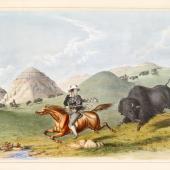
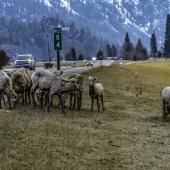
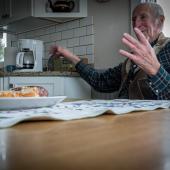
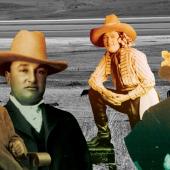
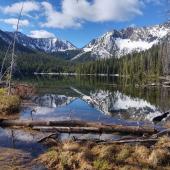
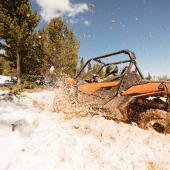
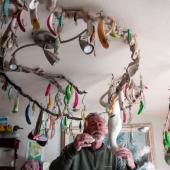
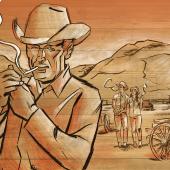

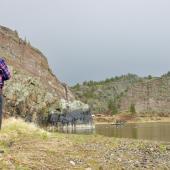
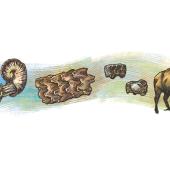

Leave a Comment Here